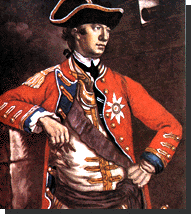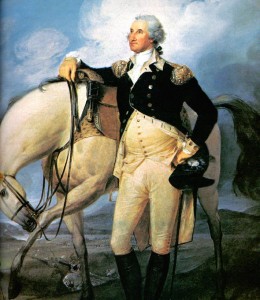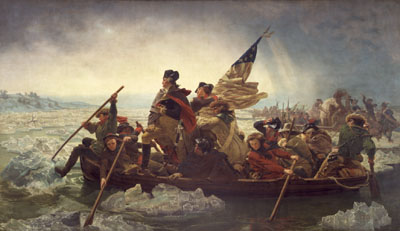It is one of the truly amazing aspects of history that epic historical tides can irreversibly develop from the simplest, seemingly obscure, and remote events. It is one of those events framed around the Christmas holiday, the American raid on Trenton December 25-26,1776, that can easily be declared as epic by any measure. It is easy to infer that without the morning battle of December 26th, the American Revolution would likely have collapsed, and history of the North American continent and therefore the world, would have been dramatically different. From such fragile roots, was borne the United States of America.
The stage leading to the events at Trenton , New Jersey, was one of almost continuous calamity for the American cause. Early victories in Boston had been quickly adjusted to by the British government, who had no intention of letting its prize American possessions slide away into the hands of “rabble”. A massive expeditionary force of almost 35000 soldiers and half the British navy had been loosed upon the American continent and had crushed the American army earlier in the year in the battle for New York, the shattered remnants of the Continental American army barely escaping into New Jersey. Vigorous pursuit left the army in tatters in Pennsylvania, felt by the British to be impotent in any capacity to do further harm. With winter approaching, General Howe, leader of the British forces saw little harm in remaining in civilized comfort in New York City, while he planned out the final offensive for next spring to trans-continentally crush the American revolt.  He felt confident enough to allow his second, General Cornwallis to leave the front lines and return to England for the winter, leaving the front in the hands of mercenary Hessian and light British forces facing across the Delaware River whatever faint outlines of an American army remained. The British owned the towns, the roads, the supplies, and the momentum. The Americans owned the cold.
He felt confident enough to allow his second, General Cornwallis to leave the front lines and return to England for the winter, leaving the front in the hands of mercenary Hessian and light British forces facing across the Delaware River whatever faint outlines of an American army remained. The British owned the towns, the roads, the supplies, and the momentum. The Americans owned the cold.
The American position was so perilous it is difficult to this day to conceptualize a way out from the impending disaster. The Continental army had contracted from 30,000 soldiers from the heady days after Bunker Hill to less than 3000 poorly fed, poorly clothed troops stuck in the cold wastes of the Pennsylvania winter. The near total collapse of the army in the New York battle had left a dangerous schism in the opinion as to who was best served to lead the American army, General George Washington or General Charles Lee,  the second in command to Washington and the only American leader with “European” experience. Lee was perfectly willing to see Washington to whither on the vine, but fortuitously managed to get himself captured a few weeks before Christmas, and his residual troops were herded toward Washington. The American governmental congress was without money and without allies, but additionally unwilling to provide Washington
the second in command to Washington and the only American leader with “European” experience. Lee was perfectly willing to see Washington to whither on the vine, but fortuitously managed to get himself captured a few weeks before Christmas, and his residual troops were herded toward Washington. The American governmental congress was without money and without allies, but additionally unwilling to provide Washington  with the necessary support for extended enlistments of state militias or adequate supplies, and certainly no pay for the troops. On December 31, 1776, the majority of the troops in the army were reaching the end of their enlistment and were going to go home for good. Washington himself though committed to the cause to the death, privately admitted in correspondence to his brother John Augustine , “I think the Game is pretty near up.”
with the necessary support for extended enlistments of state militias or adequate supplies, and certainly no pay for the troops. On December 31, 1776, the majority of the troops in the army were reaching the end of their enlistment and were going to go home for good. Washington himself though committed to the cause to the death, privately admitted in correspondence to his brother John Augustine , “I think the Game is pretty near up.”
It is at such moments that sometimes desperation proves the mother of inspiration. Washington, seeing no other choice to effect a change in direction and morale for the cause, decided to risk everything against the fortified British in New Jersey. With a win, however unlikely, he might be able to stimulate a positive commitment from the moribund American nation; with a loss…it simply wouldn’t matter anymore. He did what homework he could through a meticulous network of spies he had marshaled to report on British forward positions in New Jersey and determined to attack the fortified Hessian regiment at Trenton. As he lay across the Delaware River, he would have to fashion a perlious amphibious transition of his entire army across the river, march them ten miles in the dead of night, and sustain complete surprise among the well trained and better armed Hessian troops. He would then have to accomplish a successful withdrawal with the captured supplies before superior British re-inforcements arrived. No one gave him a chance, and no one could imagine a successful outcome.
Washington however was a leader like no other and the perfect embodiment of the American character. His password to his troops that night, “Victory or Death”. In flatboats, fighting a winter snowstorm across swirling, ice choked river water, he oversaw countless transfers of men, horses, and artillery pieces in a logistics masterpiece, and never wavered, never tired, instilling a marshal spirit in previously despondent men. He marched them to Trenton, and catching the Hessian commander Johann Rall completely by surprise, achieved a complete rout, capturing the 1500 man garrison, its supplies, and losing only two of his own men.
Out of such moments, and with the additional victory against British regulars a week later at Princeton, Washington had completely changed the dynamic of the war. The British, who had assumed American collapse was just around the corner, suddenly had to re-trench for an extended conflict. The Americans, who were preparing to give up on their dilapidated army and Quixote like cause, suddenly had a reason to believe again. General Washington had managed to invent the unique cornerstone of the American character known as American Exceptionalism, a trait we argue to this day. Like the true father of the country, he saw the potential for indomitable greatness, before any of his”children” could see it in themselves. Now that has all the makings of a true Christmas miracle.


Patrick K. O’Donnell mentioned on Steve Bannon’s War Room that the weather was also somewhat of a miracle, as a fog developed as they were crossing the river, and the wind was with them and against their enemy. Can our ‘George Washington’ beat all odds against those who would oust him? I think he lacks those brave, Exceptional men, but maybe we will all be miraculously surprised.